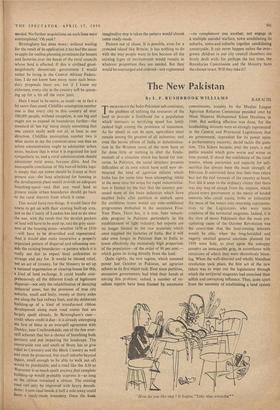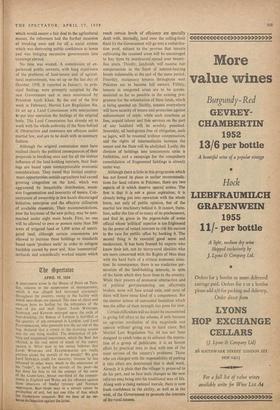The New Pakistan
By L. F. RUSHBROOK WILLIAMS KARACHI rr■ HROUGHOUT the Indo-Pakistani sub-continent, I the problem of utilising the resources of the land to provide a livelihood for a population which increases at -terrifying speed has lately ranked 'high among the problems of statesmen. As far ahead as can be seen, agriculture must remain among the greatest of all industries; and even the heroic efforts of India at induStrialisa- tion in the Western sense of the term have so far done little or nothing to alter the funda- mentals of a situation which has lasted fOr cen- turies. In Pakistan, the social structure presents difficulties of its own which have until now ob- structed the kind of agrarian reform which India has for some time been attempting; while at the same time the scope for rapid industrialisat- lion is limited by the fact that the country pos- sessed none of the basic industries which have enabled India after partition to embark upon the ambitious (some would say over-ambitious) programmes embodied in the successive Five- Year Plans. There has, it is true, been remark- able progress in Pakistan particularly in the establishment of light industry; her exports are no longer limited to the raw materials which once supplied the factories of India. But it will take even longer in Pakistan than in India to lower effectively the excessively high proportion of the population—of the order of 90 per cent.— which gains its living directly from the land.
Quite rightly, the new regime, which assumed power last October in Pakistan, set agrarian reform as its first major task. Ever since partition, successive governments had tried their hands at solving this problem; indeed, a number of ex- cellent reports have been framed by successive commissions, notably by the Muslim League Agrarian Reforms Committee presided over by Mian Mumtaz Mohammed Khan Daultana in 1949. But nothing effective was done, for the landholding interests were so strongly represented in the Central and Provincial Legislatures that no government, dependent for its power upon a parliamentary majority, dared tackle the ques- tion. This failure became; over the years, a real public scandal which grew worse and worse as time passed. It shook the confidence of the rural masses, whose patriotism and capacity for self- sacrifice has always been the main strength of Pakistan. It convinced them that their then rulers had not the real interests of the country at heart. Nor did it seem to the ordinary citizen that there was any way of escape from the impasse, which placed every government at the mercy of landed interests who could cajole, bribe or intimidate the mass of the voters into returning representa- tives to the Legislatures who were mere creatures of the territorial magnates. Indeed, it is the view of many Pakistanis that the main pre- cipitating cause of the October Revolution was the conviction that the land-owning interests would be able, when the long-heralded and eagerly awaited general elections planned for 1959 were held, to rivet upon the unhappy country an inescapable grip, in accordance with intentions of which they were shamelessly boast- ing. When the well-directed and wholly bloodless revolution took place, the first act of the new rulers was to wipe out the legislatures through which the territorial magnates had exercised their selfish and corrupting influence. Thus, quite apart from the necessity of establishing a land system `HOw do you like that ? It begins, "Take nine tentacles."' which would ensure a fair deal to the agricultural masses, the reformers had the further incentive of breaking once and for all a social system which was destroying public confidence at home and was bringing successive governments into contempt abroad.
No time was wasted. A commission of ex- perienced public servants, with long experience of the problems of land-tenure and of agricul- tural improvement, was set up on the last day of October, 1958. It reported in January; its prin- cipal findings were promptly accepted by the new Government and at once announced by President Ayub Khan. By the end of the first week in February, Martial Law Regulation No. 64 set up a Land Commission with instructions to put into operation the findings of the original body. The Land Commission has already set to work with the whole authority of the State behind it. Obstruction and resistance are offences under martial law, and are to be dealt with in summary fashion.
Although the original commission must have realised clearly the political consequences of their proposals in breaking once and for all the sinister influence of the land-holding interests, their find- ings are based upon unexceptionable economic considerations. They stated that limited employ- ment-opportunities outside agriculture had caused growing congestion on the land, which was aggravated by inequitable distribution, exces- sive fragmentation and insecurity of tenure. Con- centration of ownership in few hands discouraged initiative, enterprise and the effective utilisation of available resources. Their recommendations, now the keystone of the new policy, may be sum- marised under eight main heads. First, no one will be allowed to own or possess more than 500 acres of irrigated land or 1,000 acres of unirri- gated land, although certain concessions are allowed to increase these holdings to standards based upon 'produce units' in order to mitigate hardship caused by poor soil. Also 'commercial' orchards and scientifically worked estates which reach certain levels of efficiency are specially dealt with. Secondly, land over the ceiling-limit fixed by the Government will go into a redistribu- tion pool, subject to the proviso that tenants cultivating the resumed areas will be encouraged to buy them by instalments spread over twenty- five years. Thirdly, landlords will receive fair compensation in the form of interest-bearing bonds redeemable at the end of the same period. Fourthly, occupancy tenants throughout west Pakistan are to become full owners. Fifthly, tenants in congested areas are to be accom- modated as far as possible in the existing pro- gramme for the colonisation of State lands, which is being speeded up. Sixthly, tenants everywhere will have security of tenure and protection against enhancement of rents; while such exactions as fees, unpaid labour and free services on the part of any landlord will be severely punished. Seventhly, all land-grants free of obligation, such as jagirs, will be resumed without compensation, and the rights of intermediaries between the tenant and the State will be abolished. Lastly, the division of holdings into uneconomic units is forbidden, and a campaign for the compulsory consolidation of fragmented holdings is already under way.
Although there is little in this programme which has not found its place in earlier recommenda- tions for land reform in Pakistan, there are two aspects of it which deserve special notice. The first is that it is not a pious aspiration; it is already being put into operation with the whole force, not only of public opinion, but of the martial law machinery behind it. It cannot, there- fore, suffer the fate of so many of its predecessors, and find its grave in the pigeon-hole of some official whose 'political' superior is too frightened by the power of vested interests to risk his success in the race for public office by backing it. The second thing is its essential good sense and moderation. It has been framed by experts who know their job, not by starry-eyed idealists who are more concerned with the Rights of Man than with the hard facts of a critical economic situa- tion. In consequence, there is no vindictive per- secution of the land-holding interests, in spite of the harm which they have done to the country. While their powers of economic obstruction and of political gerrymandering are effectively broken, none will face actual ruin, and most of them will have some kind of a competence. But the sinister system of outmoded feudalism which was the pillar of their strength has gone for ever.
Certain difficulties will no doubt be encountered in giving full effect to the scheme, if only because no agrarian revolution of this magnitude can operate without giving rise to hard cases'. But Martial Law Regulation No. 64 has not been designed to catch votes or to enhance the reputa- tion of a group of politicians; it is an honest effort by practical men to deal with one of the most serious of the country's problems. Those who are charged with the responsibility of putting it into effect are determined that it shall work. Already it is plain that the villager is prepared to do his part, and to face such changes as the new reforms may bring into his traditional way of life. Along with a rising national morale, there is now fresh confidence in the ability, as well as in the wish, of the Government to promote the interests of the rural masses.



































 Previous page
Previous page